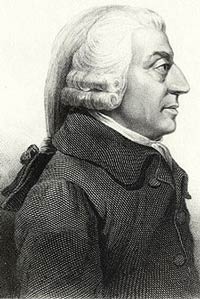
| Born: Jun 5, 1723 in Kirkcaldy, Fife, Scotland |
| Died: Jul 17, 1790 (at age 67) in Edinburgh, Scotland |
| Nationality: Scottish |
| Fields: Classical economics |
Adam Smith was a moral philosopher from Scotland a political economy pioneer. He was one of the key people of the Scottish Enlightenment and is best known for his two classic works An Inquiry into the Nature of the Wealth of Nations (usually abbreviated as The Wealth of Nations) and The Theory of Moral Sentiments. Smith is often referred to as the “father of the modern economics.”
Smith’s Early Life
Adam Smith was born in 1723 in Kirkcaldy, Scotland. His father was a comptroller of the customs at Fife, Scotland. Adam went to school at the Burgh School of Kirkcaldy and studied mathematics, history, Latin and writing.
When he later attended the University of Glasgow, his studies were based on moral philosophy under the lecturer by the name of Francis Hutchenson. This is where Adam developed his passion for reason, liberty, and free speech. He was awarded the Snell exhibition in 1740 and went on to attend the Balliol College in Oxford. Adam took time at the university to teach himself various subjects by reading several books from the library.
Smith’s Professional Years
In 1751, Adam was selected to be a professor of logic at the Glasgow University. The next year, he transferred to become the chair of moral philosophy in 1752. His lectures were based on ethics, political economy, jurisprudence and police and revenue.
In 1759, he published Theory of Moral Sentiments, which embodied some of his lectures and helped establish his reputation as a philosopher. This publication was concerned with the way human morality relies on sympathy between an agent and the spectator, or the individual and the other members of the society. It was an explanation of moral disapproval and approval.
Adam left academia in 1764 to tutor the Duke of Buccleuch. They travelled throughout Switzerland and France for more than two years. This experience brought him into contact with Voltaire and other contemporaries.
Smith’s Retirement
Adam retired to his birth town with the life pension he received. He wrote The Wealth of Nations which was published in 1776. In 1778, he was selected to be the commissioner of customs. This position required him to move to Edinburgh. In this role, he helped enforce the laws that were against smuggling.
In this publication, he defended smuggling as a legit activity under the face of legislation. In Edinburgh, Adam also founded a weekly dining club called the Oyster Club which met every Friday at the Grass Market. Adam was also a co-founder of the Royal Society of Edinburgh. In the period between 1787 and 1789, Smith published the rest of the five editions of The Wealth of Nations.
Smith’s Later Years
Smith spent the remainder of his life in Edinburgh living with his mom. He died on July 17, 1790, after a painful illness. He had devoted a large amount of his income to many charity acts that were secret. His surviving papers were released as Essays on Subjects of Philosophy in 1795.